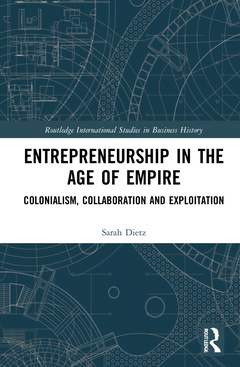Description
Entrepreneurship in the Age of Empire
Colonialism, Collaboration and Exploitation
Routledge International Studies in Business History Series
Author: Dietz Sarah
Language: English
Subjects for Entrepreneurship in the Age of Empire:
Keywords
Young Man; National Library; Land speculation; Amalendu Guha; Company promoter; BSAC; IETC; Plantation Enterprise; Entrepreneurial behaviour; Assam Plantation; British-empire prospects; MacPherson Grant; Beira Railway Company; Jute Cultivation; Debenture Holder; Group Biography; Bismarck; Mozambique; Portuguese East Africa; Joint Stock Enterprise; Cecil Rhodes; Jameson Raid; Rubber Boom; Secretary Of State; Bell Syndicate; Mozambique Company; Britain’s Informal Empire; Treasure Hunters; East Indies; Beira Railway
Publication date: 08-2022
Support: Print on demand
Publication date: 12-2020
· 15.2x22.9 cm · Hardback
Description
/li>Contents
/li>Readership
/li>Biography
/li>
Exploring the interplay of politics and commerce in one of the most dynamic periods of British history, this book traces the fortunes of the India and Eastern Trading Company Limited, established in 1906 to finance a jute plantation in Assam, north-east India. In a watershed period for commercial culture, as family capitalism and industrial economics gave way to a predominance of speculative investment and the marketing of ideas, analysis of this London-registered company and its international management forms a lens through which to view the broader socio-political and economic environment of the late-Victorian period to the interwar. Mapping the eclectic bonds that created a network of association between a multinational cast of merchants, company promoters, mining engineers, politicians and industrialists, reveals the multiplicity of strands which coalesced to create one share company. By examining their responses to the opportunities created by colonialism: to enabling legislations and set-backs, to competition and collaboration, internationalism versus rising nationalism, an important era in British history is examined from an entirely fresh perspective.
The history of the India and Eastern Trading Company Limited is a tale of cloaked agendas, of land speculation under the guise of colonial agriculture, of German and Russian interests embedded in British-empire prospects, which exposes the intrigues of some of the most infamous imperialists of the era; figures who were the subject of intense academic scrutiny throughout the twentieth century and remain at the forefront of impassioned debate in the twenty first.
Chapter One
The Company Prospectus and the Opportunity for Jute Growing in Assam
India and Eastern Trading Company ̶ The Prospectus
Chapter Two
German Enterprise in the British Empire
Alexander Classen – The Founder
Chapter Three
The Role of the Company Promoter in Joint-Stock Enterprise
Henry Theodore Van Laun – The Promoter
Chapter Four
Networks, Patronage and their International Diffusion
Eugene Auguste Digby – The Fundraiser
Chapter Five
Gentlemanly Capitalism and Britain’s Informal Empire in South America
Stanley William Ford – The Chairman
Chapter Six
InternationalCorporate Governance and Creating a Competitive Investment Culture in Joint-Stock Companies
Hugo Likiernik – The Company Secretary
Chapter Seven
Chamberlainism and the Impact of Increasing Anglo-German Antagonism on Commerce
William Burton Stewart – The Politician
Chapter Eight
The Plantation Economy, Jute Cultivation and Land Speculation
Bronisław Oderfeld – The Industrialist
Chapter Nine
Rebranding and Refinancing Colonial Enterprise
John Henry Grayson Riley – The Capitalist
Chapter Ten
The Amalgamation of Colonial Plantations During the First World War
George St. Lawrence Mowbray – The Amalgamator
Conclusion
Index
Sarah Dietz is a textile specialist who has received awards from the Royal Society of Arts and the Worshipful Company of Weavers in association with the Textile Institute. Following a successful career in the British textile industry, currently she works as an independent historian, specialising in the history of entrepreneurship.



